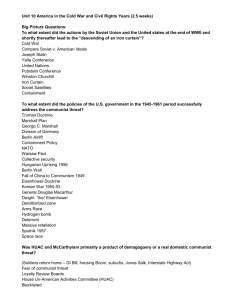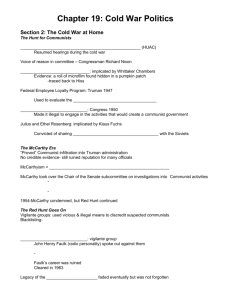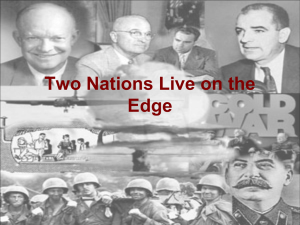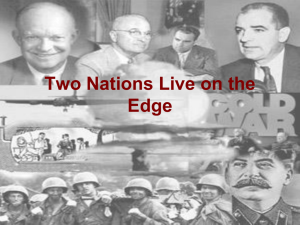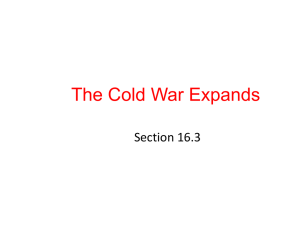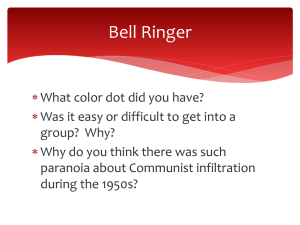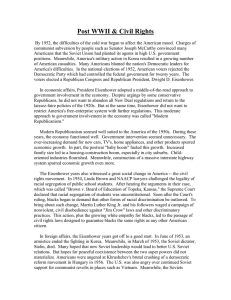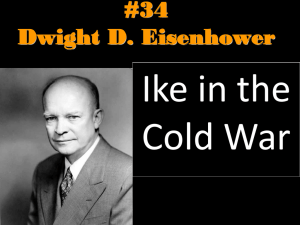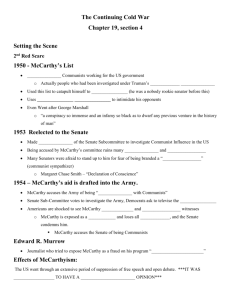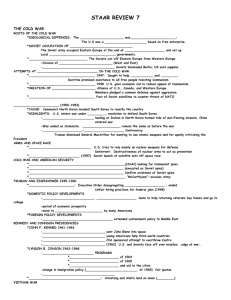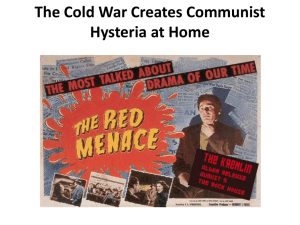Chapter 26 Section 4
advertisement
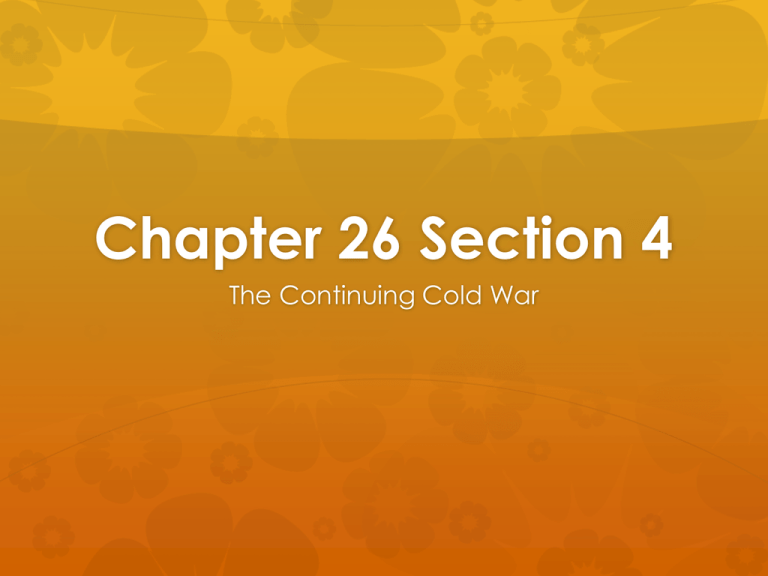
Chapter 26 Section 4 The Continuing Cold War Joseph McCarthy Senator from Wisconsin Warned of a Communist infestation in the U.S. Government Claimed that as many as 205 communist spies were working for the Secretary of State Sparked anti-communist hysteria Textbooks destroy him, but remember… Alger Hiss was a communist spy…working for the state department… The Rosenbergs were just found guilty of spying Accused of being opportunistic, The Soviets just built the atomic and hydrogen bombs with information obtained by spies Senate formally condemns him Is it possible he was on to something? a bully, and a liar for being reckless Villlianized Note: Letters released by the former Soviet Union in 1995 support many of McCarthy’s claims Joseph McCarthy Something else to keep in mind… McCarthy was a member of the Senate Permanent Subcommittee on Investigations Their job was to investigate the federal government Venona Project Alger Hiss-State department Released in 1995 Top secret document that exposed Communist spies in the U.S. Made public after the collapse of the Soviet Union Harry Dexter White- Asst. Sec of Treatury Lauchin Currie-Personal assistant to FDR Laurence Duggan-head of the Latin American desk at the State Department Frank Coe- U.S. representative on the IMF Solomon Adler- Senior Treasury department official Klaus Fuchs- Top atomic scientist Duncan Lee- Senior aid to the head of the OSS McCarthyism Making accusations against others that can not be proven or supported It is said McCarthy never found any spies T.A. Bisson Mary Jane Keeney Cedric Belfrage Solomon Adler Franz Neumann Leonard Mins Gustavo Duran William Remington Cold War in Asia 1953- Eisenhower brings the Korean War to an end With Stalin dead, and new, more moderate leaders in the Soviet Union, a solution was more easily achieved U.S. begins to aid France in recovering their lost colony in Vietnam Vietnam eventually separated, and the U.S. aids the non-communist South Cold War in The Middle East Israel created in 1948 in Palestine with help of the UN Arab assaulted the new nation and their UN allies Saw the territory as theirs The U.S. supported Israel, while the Soviets generally supported the Arabs Cold War in the Middle East U.S. backed groups that overthrew a nationalistic, communist-sympathizing leader in Iran in exchange for a pro-American Shah of Iran Cold War in the Middle East Suez Crisis U.S. wanted to help Egypt build a large dam along the Nile River Turns out the Egyptian President, Gamal Nasser was also seeking Soviet Support U.S. cut off aid Egypt closes British-owned Suez Cana as a response Vital for trade Britain, France, and Egypt attack Egypt to open canal Soviets threaten Western Europe Eisenhower urges NATO allies to withdraw from Egypt Canal opened back up But under Egyptian control Eisenhower Doctrine The United States would aid any Middle eastern nation being threatened by Communism. Cold War in Latin America Supported pro-American governments in Latin America Suppressed Communist influences 1947 Rio Pact with 18 Western Hemisphere nations as a regional defense alliance 1948- Formed Organization of American States to increase cooperation in the hemisphere 1954- U.S. backed rebels overthrow govmt. of Guatemala due to perceived Communistic Arms Race Struggle to gain weapons superiority Most dangerous aspect of the Cold War Deterrence The policy of making the military power of the U.S. and its allies so strong that no enemy would dare attack for fear of retaliation U.S. conducted 19 hydrogen bomb tests between 1954 and 1958 Brinkmanship The willingness to go to the edge of war for the purpose of maintaining peace. Used a great deal by the Eisenhower Administration How did the policy of deterrence influence U.S. actions during the Cold War? It allowed U.S. Secretary of State John Foster Dulles to use brinkmanship as a strategy Put the U.S. in diplomatic positions where threatening to apply military force presented the danger of starting a war ICBM Intercontinental Ballistic Missile Long range rockets Mastered by the Soviets The U.S. initially lagged behind in their development Sputnik The world’s first artificial satellite in Earth’s orbit The realization that the rocket used to launch Sputnik could carry a hydrogen bomb to American shores added to American shock and fear. U-2 Incident American spy plane shot down in Soviet territory. Eisenhower lied about what it actually was…but the Soviets had the wreckage…and the pilot…alive…whoops Ends Eisenhower’s effectiveness as a peacemaker by angering new Soviet Leader Nikita Khrushchev How did Sputnik and the U-2 incident affect American public opinion and policy?
